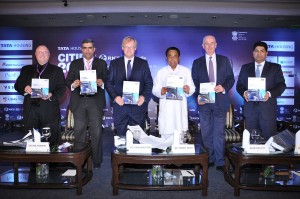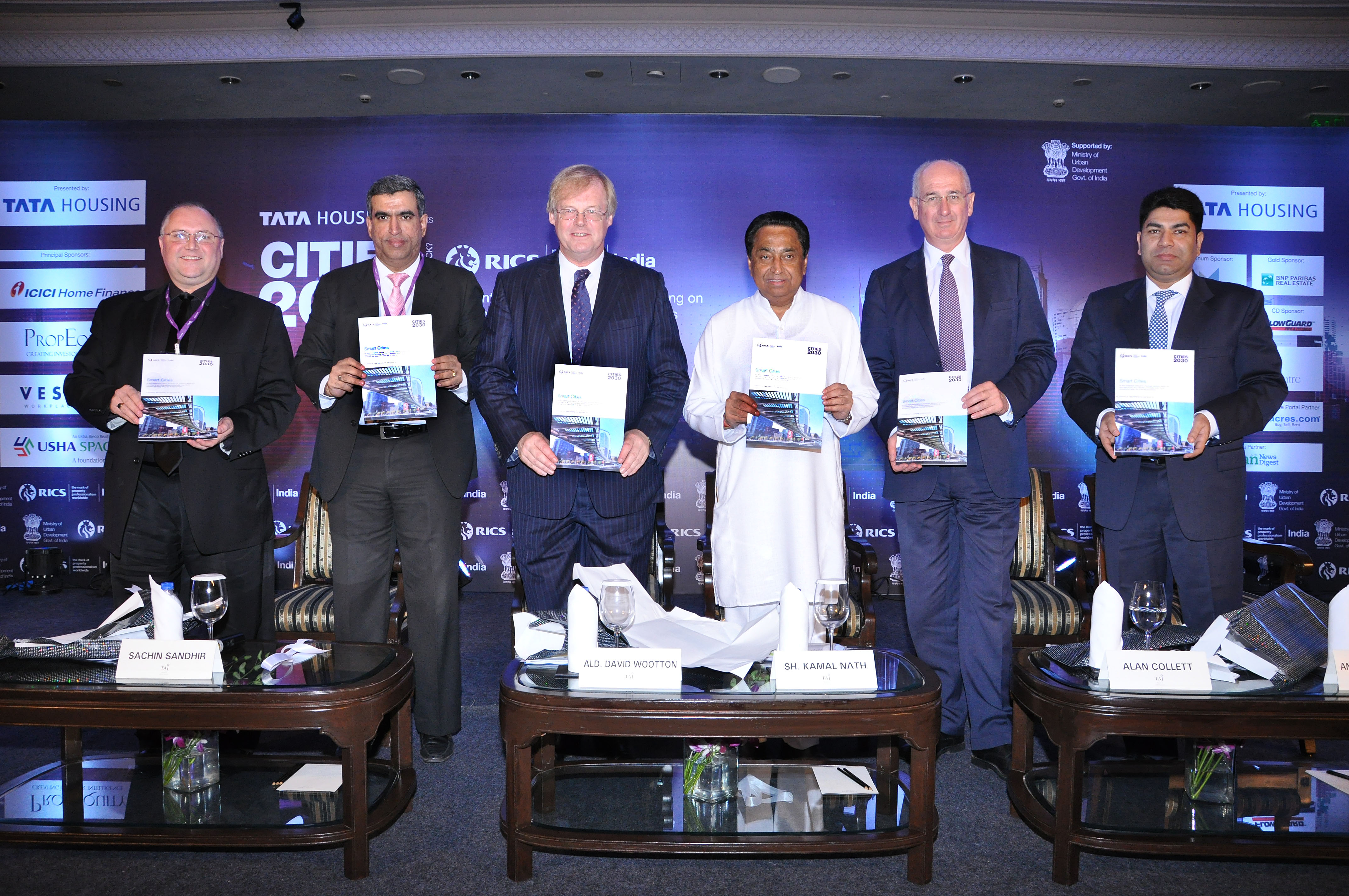 Track2Realty: Union Minister for Urban Development Kamal Nath has promised to enhance collaboration with UK to improve overall urban infrastructure. He was speaking on Monday, Oct 8, at RICS international conference-Cities 2030: Are we on track?
Track2Realty: Union Minister for Urban Development Kamal Nath has promised to enhance collaboration with UK to improve overall urban infrastructure. He was speaking on Monday, Oct 8, at RICS international conference-Cities 2030: Are we on track?Alderman David Wootton, The Righteous Lord Mayor of City of London affirmed UK’s support in providing access to finance and liquidity and also the requisite skills and specialism along the supply chain. RICS white paper titled SMART CITIES was also released at the event.
RICS, with support from the Ministry of Urban Development, and The Euro India Centre, organized this international conference on ‘Cities 2030: Are we on track?’. Vision for cities is a global policy and a research programme that aims at examining key thinking on the delivery of the sustainable cities of 2030 and beyond.
Additionally, the conference also delved deeper into 4 key pillars of infrastructure development– Planning, Finance, Technology and Skills. The focus of the one-day conference was on whether India is on track to meet all the necessary and desired outcomes to shape India’s urban future.
Kamal Nath and Alderman David Wootton were the Chief Guest and Guest of Honour respectively. The conference brought together recognized thought leaders and key decision makers from India and internationally, to help identify and take stock of tools and measures that will help integrate planning organisations and processes, build capacity in infrastructure, financially empower the public sector and promote innovation in urban management.
The RICS white paper was released by Paul Doherty, President and CEO, the digit group Inc. The paper outlines the challenges, solutions, results and next steps for any city to become a smart city by leveraging the digital DNA of the built environment.
The paper draws some interesting analogies of a city with a human body with its cardiovascular system (infrastructure), respiratory and digestive systems (energy, waste) and even a primitive nervous system (telecommunications). It urges city makers to think of their cities as a network, with each building acting as a server.
A major issue for a city’s IT department is how to manage large quantities of data generated by the city departments and wider ecosystem. Cities that solve this issue will be on the correct path to evolving into Smart Cities. No matter which of the 10 Smart City elements a city decides to focus on, data generation, compilation and interpretation will be key drivers to all policies, programs, projects and measures.
Built Environment data is already captured by city’s in various formats and processes; Building Departments, Engineering Departments, Land Departments, Planning Departments, Tax Departments, Postal Services, they all collect and manage vast amounts of data that when viewed as a whole, create the virtual representation of your physical city. The accuracy, authentication and integration of this city data is the key to a proactive approach to entering a path to becoming a Smart City.
Taking note of the report and acknowledging the need to create a smart city roadmap for India, Alderman David Wootton said, “The UK and the City of London can do much to support India’s infrastructure development needs – both in providing access to finance and liquidity and also the requisite skills and specialism along the supply chain – in particular the vital legal resources to tailor contracts and agreements to ensure the right project with the right outcomes. It is essential that the legal and financial framework is attractive to investors who will need to invest in the long term, and we are the collectors and disseminators of best practice, ensuring projects are delivered on time, to cost and to world class standards.”
Acknowledging Alderman David Wootton’s message, Kamal Nath said, “We in India have the most restrictive FAR. Even by Asian standards, it’s exceptionally low. This needs to be revised looking at the infrastructure and the location where it can be increased. One of the possibilities being discussed is transit oriented development where we can have mixed use and higher and more intensive development.”
In this context Kamal Nath further highlighted, “In India we have a need to learn from everywhere particularly from the UK. India can benefit from the British experience. We have recently signed an MoU with the UK on urban regeneration and development and its my firm belief that such a partnership would provide an enabling platform and deepen the engagement in the areas of sustainable master-planning, transport planning, land economics, heritage management, regeneration capacity building, governance, PPP arrangements. This is very important because some of the huge investment of US$ 1 trillion that we require has to come from the private sector. One of the big things in managing urbanization is going to be capacity building. Besides capacity building, the three other important areas will be planning, funding and urban governance. RICS has a unique contribution to make to the sustainable evolution of cities in India as it can draw upon the substantial shared knowledge and expertise that exists all across the world. My ministry would be happy to encourage and support such endeavors of RICS.”
Speaking at the Cities 2030 conference, Sachin Sandhir, Managing Director, RICS South Asia said, “I thank Hon’ble Minister for Urban Development Kamal Nath, Alderman David Wootton, The Rt. Lord Mayor of City of London and Dr. (Mrs) Isher Judge Ahluwalia for highlighting the challenges of explosive urban growth that has created the reality that Indian cities must change their consumption and development patterns in favor of smarter and more sustainable habits.”
He further added, “In the context of our current levels of urbanization, which are likely to increase manifold in the years to come, it is inevitable that India creates infrastructure and urban development of global standards. One key challenge that India is likely to face, while moving forward in the direction of unprecedented growth, is the absence of skilled and trained professionals that will be needed to deliver the required real estate and construction. RICS intends to bridge this gap by making available to the industry qualified professionals and experts who provide professional advice on matters as wide-ranging as sustainable urban development; affordable housing; capital markets; urban and rural infrastructure; project management and business valuation.”
The conference was attended by eminent government officials, industry experts, and policymakers





